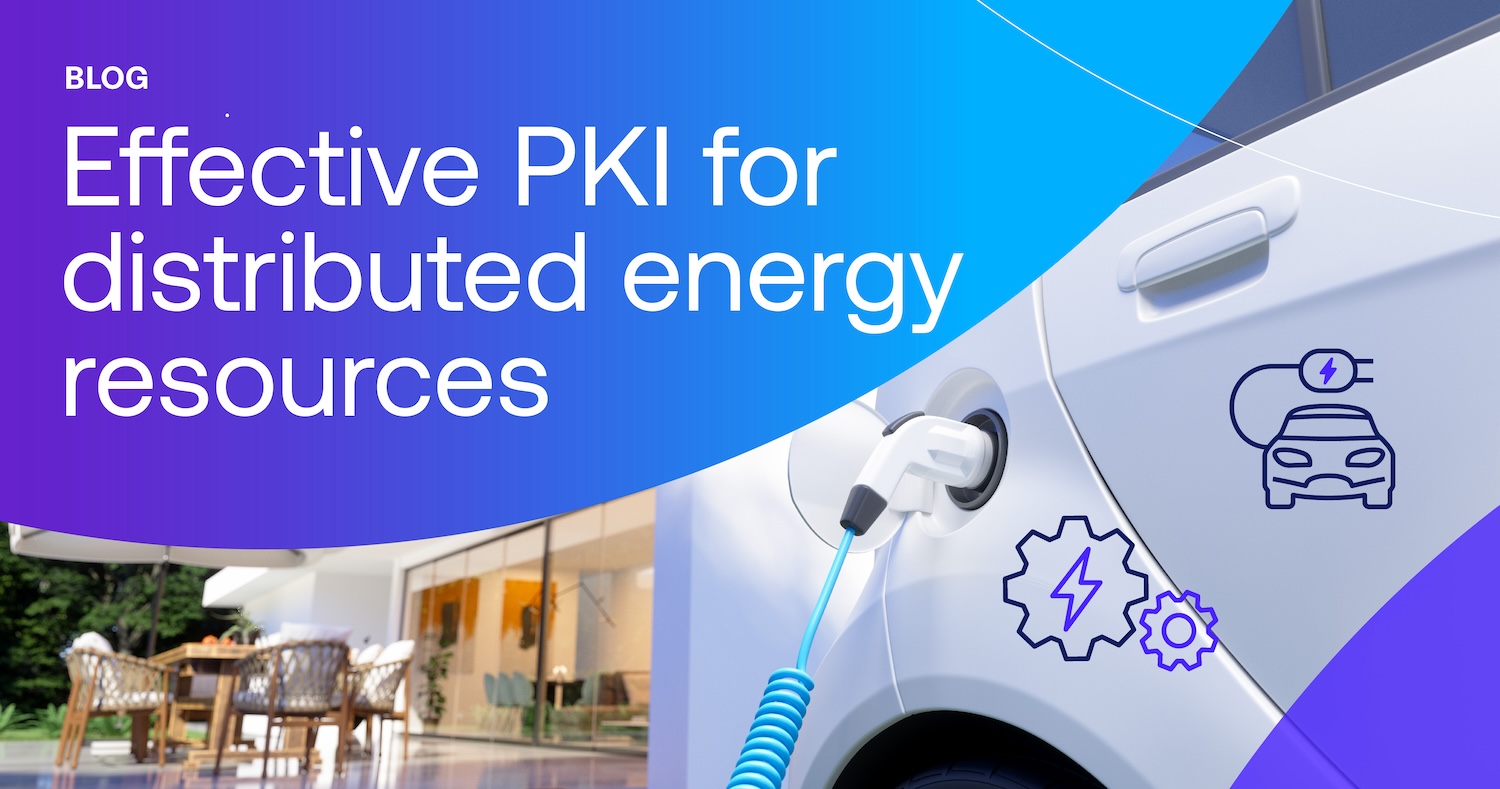Public Key Infrastructure (PKI) is the backbone of security in modern energy management systems. As energy grids become smarter and more connected through IoT, the need for secure data transmission and device authentication becomes increasingly critical. In Distributed Energy Resource Management Systems (DERMs), PKI protects and helps to ensure that all communication between devices is secure, protecting the grid from unauthorized access and malicious threats.
Imagine a scenario where renewable energy sources like solar panels and wind turbines are integrated into the energy grid. Each device needs to communicate its energy output data securely. PKI provides the tools to verify the identity of these devices, ensuring that the data comes from a legitimate source. Without a robust PKI solution, the risk of data manipulation or cyberattacks on the grid increases significantly. By establishing trust in each communication point, PKI helps maintain the integrity and reliability of the energy supply.
Security dangers and inadequacy of PKI systems built in-house
Building a PKI system in-house might seem like an attractive option for organizations looking to maintain control, but it comes with several critical challenges:
- Lack of expertise and staffing. PKI systems require specialized knowledge in cryptography, secure hardware management, and compliance. Many organizations underestimate the complexity involved. Even if they manage to set up an initial system, maintaining and updating it requires a dedicated team of experts who can stay ahead of evolving threats. Without this expertise, the system can quickly become vulnerable.
Picture a small team of IT staff tasked with managing an entire PKI system. They not only need to handle day-to-day operations but also ensure the system meets evolving industry standards and compliance requirements. If any one of these staff members leaves or if the team becomes overstretched, the system’s security can be compromised. - High upfront capital expenditure (CapEx) and operating expenditure (OpEx). Setting up a PKI system requires significant investment in both hardware (secure servers, hardware security modules) and software (encryption algorithms, management interfaces). In addition, ongoing costs include hiring and training personnel, conducting audits, and ensuring compliance. Over time, these costs can accumulate, especially as the system needs to scale to accommodate growth.
- Difficulty staying current with security measures and compliance. Cybersecurity threats evolve quickly, and so do compliance regulations. Managing an in-house PKI system requires constant updates to meet these new standards, which is often beyond the capabilities of small or mid-sized organizations. Falling behind in compliance can lead to fines and regulatory action, making it a risky endeavor.
- Scalability challenges. As businesses grow, their PKI system must expand to support more devices, connections, and data flow. In-house systems often lack the scalability needed, resulting in performance bottlenecks or limitations that can stifle growth.
- Inadequate key management, certificate issuance, and cryptographic algorithms. In-house PKI solutions may not have the rigorous protocols needed for secure key management, leading to weak cryptographic practices. This could result in certificates being issued without proper validation or the use of outdated encryption algorithms, exposing the system to potential breaches.
The unique value of Intertrust’s managed PKI service
Intertrust’s managed PKI service, iPKI, offers a comprehensive solution that eliminates the challenges associated with in-house systems. By leveraging its expertise and state-of-the-art infrastructure, Intertrust provides a scalable and secure PKI service that meets the needs of modern energy management systems:
- Long-standing WebTrust certification. For over 14 years, Intertrust has maintained WebTrust certification, a mark of excellence in private certification authorities (CAs). This certification ensures that the PKI services adhere to the highest standards of security and compliance.
- Expertise in complex embedded environments. Intertrust brings years of experience in managing PKI solutions across complex and demanding environments. This is particularly valuable for industries like energy management, where hardware integrations and IoT deployment need specialized knowledge. The Intertrust team’s deep bench of experts ensures that each solution is tailored to specific requirements, minimizing risks, and enhancing system performance.
- Secure compartmentalized information facility (SCIF). Intertrust’s SCIF provides the highest level of physical security. This air-gapped, tempest-shielded facility ensures that critical cryptographic operations are isolated from any external threats. Protocols like multi-operator verification and triple-factor authentication add multiple layers of security, while all root keys are stored offline in secure safes. This environment guarantees that your PKI system remains protected, even from sophisticated attacks.
- Cloud CA for high performance. The cloud-based certificate authority (CA) service ensures high availability and performance, providing seamless certificate issuance and management. This solution is ideal for energy management systems that require real-time response and flexibility.
- Comprehensive provisioning capabilities. Whether it’s provisioning certificates on a factory floor or over-the-air certificate signing requests (CSRs), Intertrust’s managed PKI service supports bulk operations and efficient deployment. This flexibility is crucial for companies looking to scale their energy systems rapidly without compromising security.
Conclusion
In today’s rapidly evolving energy landscape, the security of your Distributed Energy Resource Management Systems (DERMs) is non-negotiable. Choosing the right PKI solution is a foundational step in ensuring the reliability, compliance, and resilience of your grid infrastructure. Intertrust’s managed PKI service stands out as a robust, scalable solution, offering a track record of securing billions of devices and transactions globally. Whether you’re expanding DERM capabilities or integrating new energy sources, partnering with Intertrust means having a trusted and proven expert by your side.
Ready to strengthen your energy management security? Contact our experts for a consultation and discover why leading industries choose Intertrust PKI solutions.
Stay tuned for our next blog, where we explore common PKI deployment mistakes and how to avoid them.
